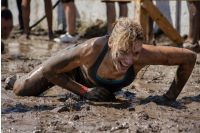
Lessons on Resiliency from the Special Ops
By Robin Phillips
This year the History Channel finished releasing the first season of an unscripted documentary called “The Selection: Special Operations Experiment.” The series, which can be accessed through the History Channel, followed 30 men and women who volunteered to be part of a grueling test of physical and mental endurance modelled on the special operations selection process.
The participants, all of whom had no military background, came together to face the most intense challenge any of them had ever endured. A team of Navy SEALs, Green Berets and Army Rangers pushed the participants to the limits of what the human brain and body can endure, including exposure to extreme cold, sleep deprivation, psychological warfare, tear gas and verbal abuse.
Each day the tests became more intense, with various participants quitting. During the first two days, the people who quit were those who lacked sufficient physical strength to endure the different activities. However, around day three, the instructors began to test the mental strength of the participants. By the end of the selection process, those who remained were distinguished not simply by their physical stamina, but also by their mental toughness. A key component of this mental toughness was honesty and a willingness to go on a journey of self-discovery.
In Season 1, Episode 3, “Man in the Arena,” a participant named Dylan Davis was blindfolded and brought into an interrogation room. Dylan, who was known as “Number 6,” was questioned about the real reason he decided to participate in the program. After some unsatisfying pat answers, Dylan admitted he was there because he felt he hadn’t been a good man. When pressed further he shared that he had experienced a series of troubled relationships, with various people in his life criticizing him for being lazy, not listening, lacking focus, not being strong enough, not tall enough, big enough or smart enough. As Dylan broke out in tears, the instructor said, “You need to start being okay with who you are and stop listening to everyone else. And that is the only way that you may possibly get through this course.”
The instructor who made this comment knew what he was talking about because of his own experiences in war-time situations. He understood that self-confidence is a key factor for resiliency.
Self-confidence does not mean false optimism about ourselves and our abilities. A strong and stable person is someone who knows his or her own strengths, which includes knowing the limits of those strengths. There is thus an important connection between self-confidence and self-knowledge. However, when our sense of self is hijacked by shame or by the type of learned helplessness that emerges from dysfunctional relationships, it can become very difficult to accurately assess our own strength. For example, a negative view of the self may result in us projecting a false strength, since we have learned to associate weakness with shame and guilt. A negative self-image may also result in our inner-stability being so fragile that it stands or falls according to the reactions of those around us.
It all comes down to being okay with who you are. Being okay with who you are is necessary for facing discouragement without becoming demolished, experiencing defeat without being crushed, and being willing to take risks even if it involves the possibility of failure.
In his book Warrior Mindset: Mental Toughness Skills for a Nation’s Peacekeepers, Michael Asken discussed the connection between self-confidence and success:
Negative thinking is at the root of self-doubt. The concept of self-fulfilling prophecy says that our expectations about success or failure greatly influence our efforts and performance on a task. . . A study was done on competitors at a national arm wrestling championship. . . Each pair of finalists was tested for arm strength and each member was then given false feedback. The objectively stronger member of the pair was told he was weaker and the objectively weaker competitor was told he was stronger. In a majority of the final matches, the objectively weaker competitor won the event.
One participant in “The Selection: Special Operations Experiment” was a man named Christian Griffith, known simply as “Number 11.” During his interrogation, Griffith explained that as a victim of childhood sexual abuse, he wanted to show people that their past does not have to define their future, and that it is possible to bounce back after being knocked down. During his interrogation, Griffith was asked to recite the creed of the course, from Teddy Roosevelt’s famous Man in the Arena speech. In this passage, Roosevelt suggested that the important thing is not whether a person succeeds or fails, but the attitude a person brings to the struggle:
It is not the critic who counts; not the man who points out how the strong man stumbles, or where the doer of deeds could have done them better. The credit belongs to the man who is actually in the arena, whose face is marred by dust and sweat and blood; who strives valiantly; who errs, who comes short again and again, because there is no effort without error and shortcoming; but who does actually strive to do the deeds; who knows great enthusiasms, the great devotions; who spends himself in a worthy cause; who at the best knows in the end the triumph of high achievement, and who at the worst, if he fails, at least fails while daring greatly, so that his place shall never be with those cold and timid souls who neither know victory nor defeat.
Christian Griffith was the oldest participant in the course and by no means the strongest physically. However, he completed the course while stronger individuals dropped out. The key to his resiliency was his strong inner resolve. This confirms what the psychiatrist Viktor Frankl observed while a prisoner in Nazi concentration camps. In his bookMan’s Search For Meaning, Frankl noted that the ability to tap into inner resources of meaning was even more predictive of whether a prisoner would survive than the physical condition of that person upon entering the camp. Sensitive people of “a less hardy make-up” who possessed “a life of inner riches and spiritual freedom”, often “seemed to survive camp life better than did those of a robust nature.”
We observe this same dynamic in the world of licensure prep. A self-image rooted in other people’s perceptions of us, or in cognitive distortions like I’m fake or I’m not smart enough can lower the resiliency and self-confidence needed during the licensure preparation process. (See our earlier post: How Cognitive Distortions May Affect Your EPPP Success.) The mental and emotional resiliency derived from a strong inner resolve is important during the period of test preparation or else a candidate may begin imagining that his or her success as a person depends on a passing score. Even a failing score does not mean defeat unless you refuse to get back up. (See our post Bounce Back after Exam Failure.)
Further Reading
Prepare for the NCMHCE with Techniques from the Special Forces




